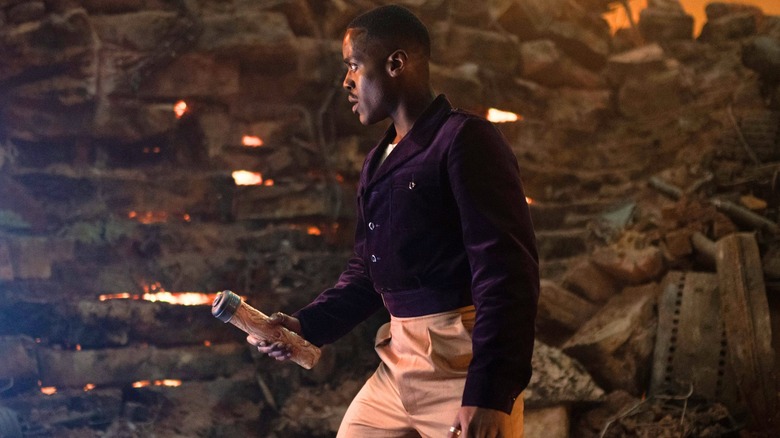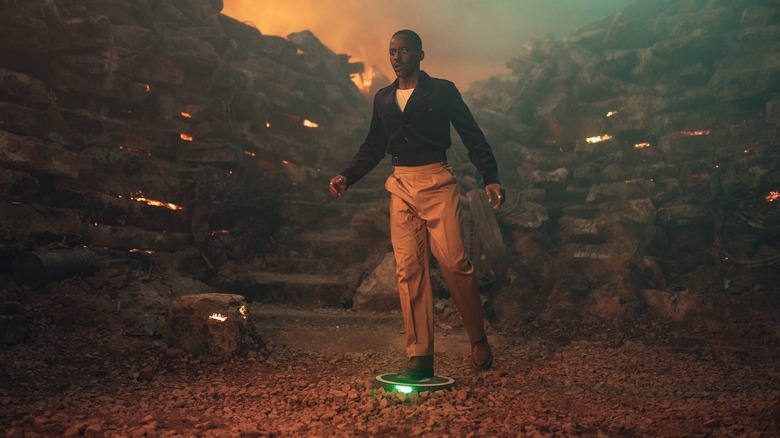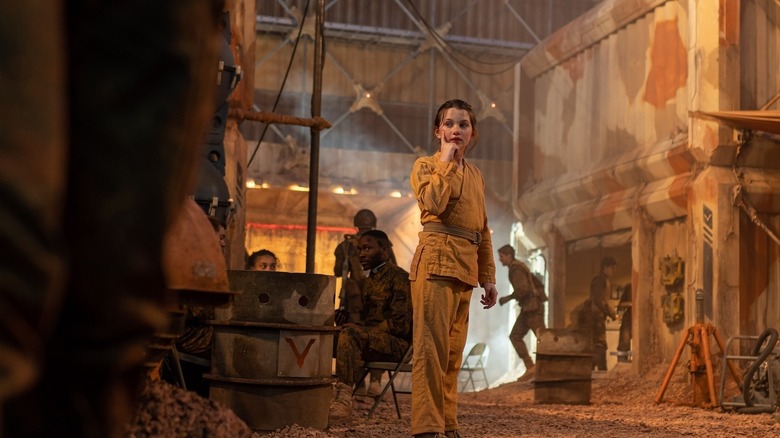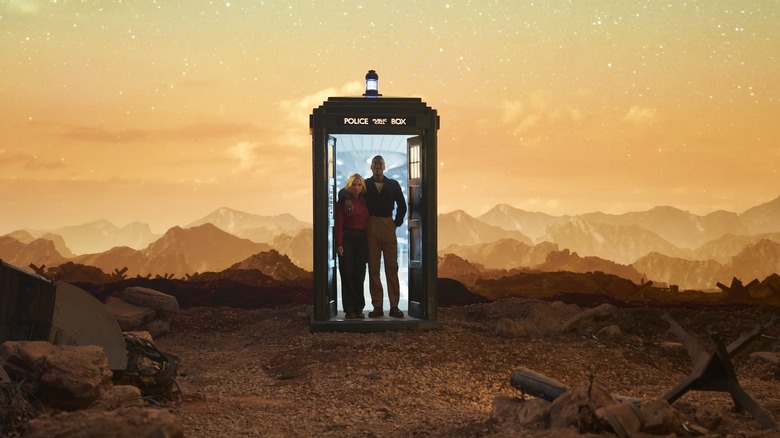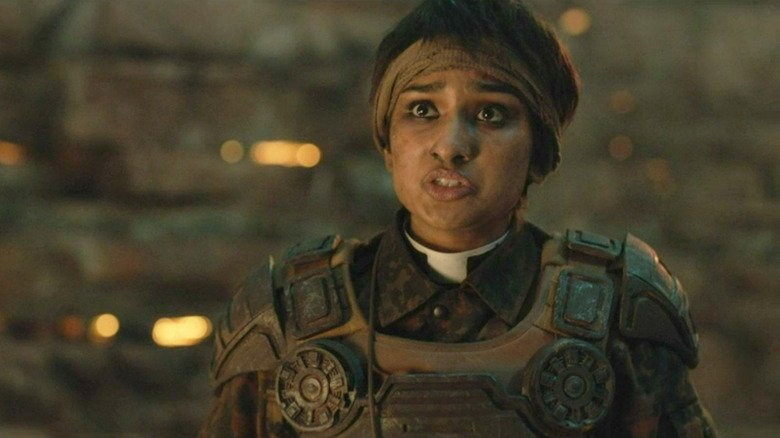Steven Moffat's New Doctor Who Episode Is Disappointing In A Very Familiar Way
Steven Moffat is one of the most divisive names in the "Doctor Who" fandom. First he was the beloved writer who gave us one amazing story per season. Then he was given the reins of the show in 2010 and the audience's good will started to slip away. By season 7 he'd gotten a reputation as a guy whose storylines were too complicated for their own good, and as a showrunner who was sort of bad at writing realistic, three-dimensional characters who weren't named the Doctor. Particular scrutiny was given to how he wrote women; we loved River Song when she was introduced in season 4, but by the end of Eleven's run it felt like most of his female characters were just River Song variants. Moffat loves himself an aggressively badass woman who never stops flirting, but fans themselves grew tired of it.
The good news is that the Peter Capaldi era proved that Moffat was capable of switching things up. The thinly-written season 7 Clara (Jenna Coleman) suddenly started to feel like an actual person in season 8, and went on to have perhaps the most interesting and complicated dynamic with the Doctor we've ever seen in the revival. He switched things up again with Bill Potts (Pearl Mackie), a massive departure from Moffat's usual companion archetype. He even played around with the seasons' structures, giving us a season 9 filled with two-parters and a season 10 with a surprising three-parter tossed into the middle.
Moffat may not have won all the haters over, but he did prove by the end of his era that he knew when to switch things up. He knew when the old tricks weren't working, when he'd need to do something fresh. So with his latest episode, "Boom," what went wrong?
'Boom' echoes moments in 'The Empty Child' and 'Let's Kill Hitler'
Spoilers below for "Doctor Who" season 1, episode 3: "Boom."
While no idea can be truly original (even Moffat's Weeping Angel concept was done already with the hedge animals in Stephen King's "The Shining") it's rare to see something like "Boom," where nearly everything feels like a retread of previous Moffat concepts. The AI ambulance that "heals" people in a misguided way feels awfully similar to the nanobots in "The Empty Child," who were turning people into mask-covered zombies out of a biological misunderstanding. This is one of the more forgivable retreads, as it at least comes with the social commentary on for-profit healthcare, but what about the rest of the episode?
"Boom" also features a romance subplot between two soldiers, Mundy (played by Varada Sethu)) and Canto, and their dynamic is a CliffsNotes version of young Amy and Rory's. Canto is shy and doting while Mundy is tough, brash, and in denial about how Canto's in love with her. Why is Canto in love with this woman he has zero chemistry with? We'll never know for sure.
The scenes where Mundy insists Canto's not interested in her might give you traumatic flashbacks to that awkward season 6 scene where an oblivious teenage Amy insists that Rory's gay — it's an absurd misunderstanding that feels callous and unconvincing rather than cute and comedic. The difference is that while Amy and Rory had two-and-a-half seasons to grow beyond this dynamic, Mundy and Canto have five minutes, and then Canto's dead and we're expected to care. Throwing a half-baked tragic love story might seem like a baffling choice for this jam-packed episode, but it's unfortunately the norm. Every character here who isn't the Doctor or Ruby is written in a weird, awkward, unsatisfying way.
Splice: an unconvincing character
The other attempted emotional throughline in "Boom" is Splice (Caoilinn Springall), a young girl who walks in on the Doctor and Ruby's predicament, asking them about her recently-murdered father. The actress does a fine job with what she's given, but Splice never reacts to her father's death in a way that feels convincing, and the episode does her no favors by turning her oblivious presence into a major obstacle for an already stressed-out Doctor to deal with.
Kid characters are rarely written well on "Doctor Who," but Moffat's usually an exception with them. Young Kazran from "The Christmas Carol" felt like he was written by someone with respect for children, who saw them as just as complicated and interesting as adult characters. But Splice is written with a sort of condescending simplicity, going back and forth between a convenient burden for the adults to deal with and a pleasant background prop. The laziness of her character is punctuated by the Doctor's closing remark that she'll probably grow up to be president someday. Splice never does anything to distinguish herself as smart or unique, so the line just reads an empty, generic praise.
The Doctor also tells Splice to prepare "fish fingers and custard" for him the next time he pops into her life, which feels like a shallow attempt to return to Eleven's dynamic with child Amy back in season 5. The difference is that child Amy was a real character who had a fun repertoire with Eleven; by bringing her up, all the episode is doing is reminding us how empty the Doctor and Splice's relationship is in comparison. There's no reason to assume the Doctor would ever return for either her or Mundy, or that these two would stick out to him in any significant way.
A 'Forest of the Dead'-esque finale
Where "Boom" succeeds is with the stressfulness of its simple premise. The Doctor is stuck on an advanced alien landmine, and he can't move a muscle without blowing up. It's an effective idea, even if it is just another variation on "don't blink" or "don't breathe" or "don't look." Moffat loves the idea of not being allowed to do a basic everyday thing with your body, but it's hard to blame him when it works this well. The Doctor's predicament isn't just scary because of how precarious it is, but because of the empathy it evokes. It leaves us wondering how long we'd last in this situation, and unsettled with the likelihood that we'd explode within the first thirty seconds.
Where "Boom" fails is with its hasty conclusion, where the digital consciousness of Splice's father hacks into the villain's mainframe and solves everything. Moffat loves a good fake-out death, and he borrowed a plot point from "Silence in the Library"/"Forest of the Dead" to pull this newest one off with Ruby. But whereas the digital consciousness storyline in that season 4 two-parter was explored and built up to, the resolution here feels rushed. The conclusion relies on the audience's investment in Splice's relationship with her father, a relationship that only works if you find John's "kiss kiss" catchphrase to be meaningful rather than awkward and sappy.
It's all disappointing because it's been nearly eight years since Moffat's last written for the show; surely he should have learned a new trick or two in the time he's been away? We don't know what he's got planned in this year's Christmas episode, which he's recently announced he'll be writing, but I sure hope it'll be something more inspired than this. On the bright side...
'Boom' introduces the next companion, Mundy
Whovians were surprised when it was announced earlier this year that Varada Sethu (of "Andor" fame) would be the Fifteenth Doctor's next companion. We wondered why they revealed her so soon, but "Boom" gives us the answer. Turns out, current showrunner Russell T. Davies has picked Moffat to redo another one of his most famous tricks: introduce the next companion before her time.
So how does "Boom" compare to "Asylum of the Daleks," the season 7 episode that introduced Clara while Amy and Rory were still the full-time companions? In this respect, at least, it's an improvement. "Boom" makes the refreshing choice of letting Mundy be a relatively straightforward character. Her romance with Canto may be dull, but at least Mundy doesn't die at the end. We won't be meeting her mysterious clone next time; Mundy will already be familiar with the Doctor and how he operates.
Fans of the "Doctor Who" revival have often hoped for a full-time companion that's not from the 21st century, and Mundy promises to be one of them. It'll be nice to have a companion who doesn't need to go through as much of a learning curve regarding aliens and advanced tech, and who doesn't necessarily need to be as much of an audience surrogate as a typical companion from the 21st century. "Boom" might not be Moffat's best outing, but it does at least promise a fresh new Doctor/companion combo down the line.
